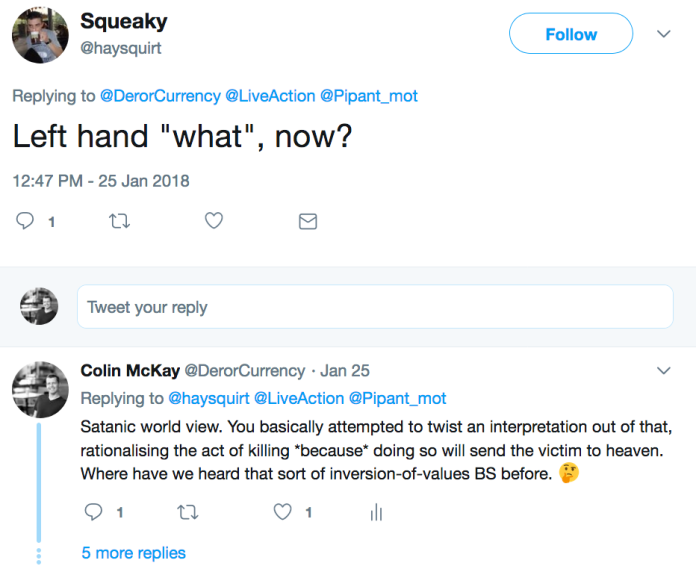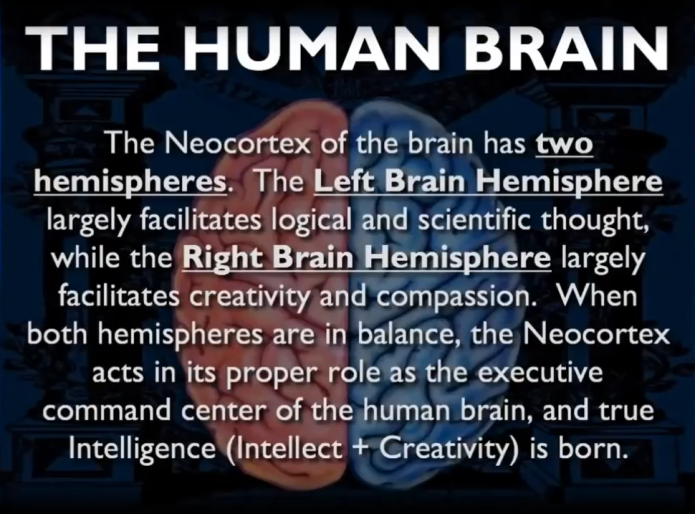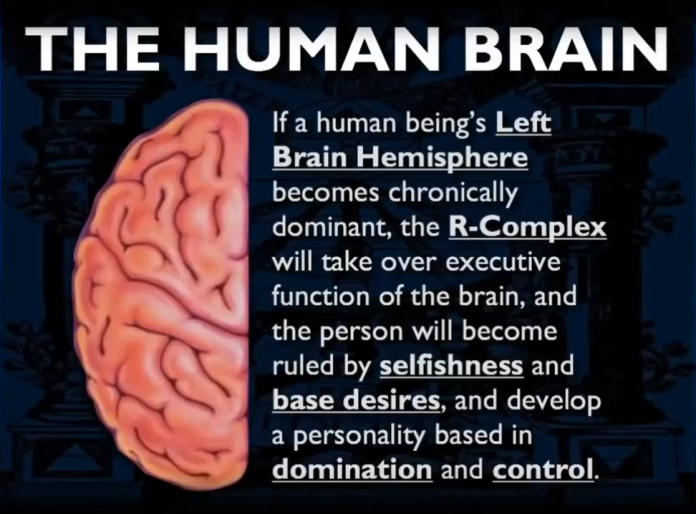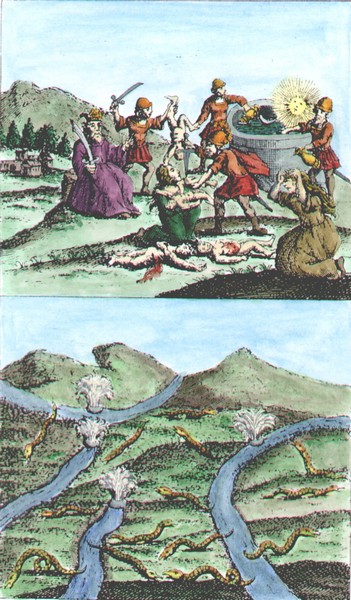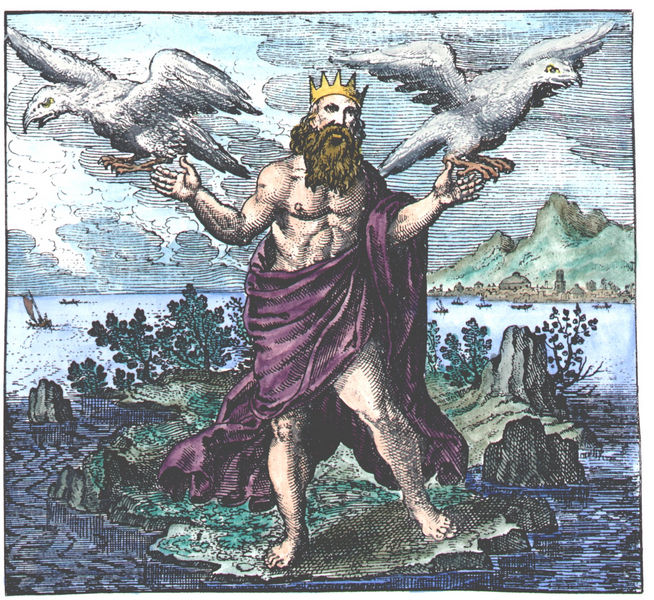
This is in fact the formula of our Magick; we insist that all acts must be equal; that existence asserts the right to exist; that unless evil is a mere term expressing some relation of haphazard hostility between forces equally self-justified, the universe is as inexplicable and impossible as uncompensated action; that the orgies of Bacchus and Pan are no less sacramental than the Masses of Jesus; that the scars of syphilis are sacred and worthy of honour as much as the wounds of the martyrs of Mary.
..the existence of “Evil” is fatal to philosophy so long as it is supposed to be independent of conditions; and to accustom the mind to “make no difference”[1] between any two ideas as such is to emancipate it from the thralldom of terror.
The Magician should devise for himself a definite technique for destroying “evil”. The essence of such practice will consist in training the mind and body to confront things which cause fear, pain, disgust, shame and the like. He must learn to endure them, then to become indifferent to them, then to analyse them until they give pleasure and instruction, and finally to appreciate them for their own sake, as aspects of Truth.
Aleister Crowley, Liber V vel Reguli (Ritual of the Mark of the Beast) [2]
I will just say it.
The global accounting, banking, and ‘money’ systems, are Satanic.
Philosophically.
All three systems are based on and operate according to fundamental principles that are identical to those in the philosophy and practice of satanism.
They are also identical to those in the “system of thought” that George Orwell described as doublethink.
An honest observer should be able to see this clearly, with a little thoughtful reflection.
According to a former priest in the (Anton LaVey) Church of Satan, the four main tenets of satanic ideology are:
- Self-Preservation
- Moral Relativism
- Social Darwinism
- Eugenics
These principles can be discerned in just one passage from the most notorious and influential Black Magician of the twentieth century:
We have nothing with the outcast and the unfit:
let them die in their misery. For they feel not.
Compassion is the vice of kings: stamp down the
wretched and the weak: this is the law of the
strong: this is our law and the joy of the world.
Think not, o king, upon that lie: That Thou
Must Die: verily thou shalt not die, but live.[3]

Woodcut by Jost Amman from Jacob Rueff, De conceptu et generatione hominis, Frankfurt, 1587. © Adam McLean 1997-2017 (alchemywebsite.com). Used with permission.
This is emphasised by the Fraternitas Saturni (Brotherhood of Saturn) in an oxymoronic, ‘blackwhite’ expansion on Crowley’s dictum “Do as thou wilt shall be the whole of the Law”:
Love is the Law, Compassionless Love.[4]

‘Art’ work allegedly owned by John Podesta. Note colours: ‘white’ demon (with Male, red-haired child) on Left; ‘black’ demon (with Female, white-haired child) on Right.
In Thus Spoke Zarathustra: A Book for All and None, nihilist philosopher Friedrich Nietzsche equated pity with self-annihilation.[5] For the satanist, or Black Magician, rejection of pity is “the magical equivalent of the rejection of self-annihilation.”[6]
In other words, to “emancipate” or “liberate” oneself entirely from the “bond” of compassion, of empathy for other beings, is seen as an act of Self-Preservation.
In our time compassion is even forbidden by science, as is already happening in England, where they have political economy.
Fyodor Dostoevsky, Crime and Punishment, 1866

Mark Passio, “Natural Law: The Real Law of Attraction” © Mark Passio, whatonearthishappening.com
‘Modern’ accounting, banking, and ‘money’ – the foundations of global finance, markets, economic and political life – all operate on the Double Entry Bookkeeping system.
Many historians and economists, including (eg) Werner Sombart, Max Weber, and Joseph Schumpeter, have traced the development of modern capitalist business practice to the Double Entry system, attributing to it the “pitiless” spirit of modern commerce in its “unending, systematic pursuit of profit”:
In [Schumpeter’s] view, double entry’s “cost-profit calculus” drives capitalist enterprise – and then spreads throughout the whole culture: “And thus defined and quantified for the economic sector, this type of logic or attitude or method then starts upon its conqueror’s career subjugating – rationalizing – man’s tools and philosophies, his medical practice, his picture of the cosmos, his outlook on life, everything in fact including his concepts of beauty and justice and his spiritual ambitions.” For Schumpeter, capitalism “generates a formal spirit of critique where the good, the true and the beautiful no longer are honoured; only the useful remains – and that is determined solely by the critical spirit of the accountant’s cost-benefit calculation”.[7]
Karl Marx – the 19th century arch materialist – stated that accounting is even “more necessary” for a communist system:
As unity within its circuits, as value in motion, whether in the sphere of production or in either phase of the sphere of circulation, capital exists ideally only in the form of money of account, primarily in the mind of the producer of commodities, the capitalist producer of commodities.
Bookkeeping, as the control and ideal synthesis of the process, becomes the more necessary the more the process assumes a social scale and loses its purely individual character. It is therefore more necessary in capitalist production than in the scattered production of handicraft and peasant economy, more necessary in collective production than in capitalist production.[8]
As we have seen in previous essays (here, here), Double Entry Bookkeeping was not created as a neutral, objective tool for value-adding producers or manufacturers to manage their costs. It was developed by merchants (traders) from the dawn of mercantile capitalism, as a tool whose real “use” value was to conceal their illegal practice of usury from Church-State authorities. It also served as a psychological tool of self-deception, enabling the merchant to convince himself that his actions were morally (thus ‘divinely’) justified – as “proved” by his meticulously-recorded and balanced books.
Merchants or traders have been condemned by true sages and religious divines throughout history and across many cultures, because their actions were seen as parasitic, and immoral; not adding to the common wealth of society, but merely taking from that produced by others.[9] The merchant is an intermediary, a middleman between producer and consumer, who aims to “buy low and sell high”, whether by fair means or foul (hello storytelling: advertising, marketing, “Public Relations”). He profits in whole or in part through taking advantage of what many today euphemistically call “information asymmetry” – which in other, more honest words, means the relative (to oneself) ignorance of others.
Double Entry embodies the satanic doctrine of Self-Preservation. The goal of the Black Magician is to become ‘as god’ – the Absolute, the One, the All, the Nothing, the ‘Divine Mind’ or ‘Pure’ Intellect – without sacrificing* his or her “individuated existence”.
(*The exact opposite of the Christian doctrine of self-sacrifice, and its ultimate aspiration of self-less union with, or complete self-annihilation in, the Divine; e.g., Matthew 16:20-25.)
Double Entry is a numeric and sophistic tool of control over the real or imagined events of the past, present, and future. It offers the possibility of becoming ‘as god’; of attaining Ultimate Power over the material realm (“Money Power”), which the magician equates with power over the imaginary (‘divine’ mind) realm as well.

This serpent, SATAN, is not the enemy of MAN, but HE who made Gods of our race, knowing Good and Evil; He bade ‘Know Thyself!’ and taught initiation. He is ‘the Devil’ of the Book of Thoth and His emblem is BAPHOMET, the androgyne who is the hieroglyph of arcane perfection.[10]
According to Lewis Mumford (Myth of the Machine), accounting’s “concentration on abstract pecuniary rewards” – Profit (or Loss) – “introduced a driving motive into daily life, equivalent on its own base level to the monk’s search for an eternal reward in Heaven. The pursuit of money became a passion and an obsession: the end to which all other ends were means.”
Double Entry Bookkeeping also embodies the satanic doctrine of Moral Relativism.
The core of Crowley’s magical philosophy is the willed dissolution of opposites – “Let there be no difference … between any one thing and any other thing.” – in greater unity (agape, love).[11]
[As we have seen, ‘love’ in satanic doctrine is “Compassionless”, “pitiless”.]
Every single transaction recorded by Double Entry, is entered twice. The one action or event (real or imaginary) is dissolved or divided into two records which, in effect, cancel out or an-nihil-ate each other: a debit entry, and an equal and opposite credit entry.
Debits must equal Credits.
Negatives must equal Positives.
‘Evil’ must equal ‘Good’.
Black must equal White.
The union of both – the “sacred marriage” or “union of opposites” – equals Nothing:
I am God, I very God of very God; I go upon my way to work my Will; I have made Matter and Motion for my mirror; I have decreed for my delight that Nothingness should figure itself as twain… [two]
I am the None, for all that I am is the imperfect image of the perfect; each partial phantom must perish in the clasp of its counterpart, each form fulfil itself by finding its equated opposite, and satisfying its need to be the Absolute by the attainment of annihilation.
The World LAShTAL includes all this.
LA—Naught.
AL—Two.
LA … represents the Ecstasy of Nuit and Hadit conjoined, lost in love, and making themselves Naught thereby. [..]
AL, on the contrary, though it is essentially identical with LA, shows “The Fool” manifested through the Equilibrium of Contraries. The weight is still nothing, but it is expressed as it were two equal weights in opposite scales. The indicator still points to zero.
[“ShT” is “Fire” (Sh) and “Force” (T); it “expresses the secret nature which operates the Magick or the transmutations.” Abbreviation of “Shaitan”; Satan.][12]

The Fool, Thoth Tarot deck, Aleister Crowley’s Book of Thoth, Liber LXXVIII. (Source: bibliotecapleyades.net)
The Double Entry system embodies what George Orwell referred to in his dystopian novel Nineteen Eighty-Four as “the system of thought which really embraces all the rest, and which is known in Newspeak as doublethink [..] a vast system of mental cheating”:
Doublethink means the power of holding two contradictory beliefs in one’s mind simultaneously, and accepting both of them.[13]

The key word here is blackwhite. Like so many Newspeak words, this word has two mutually contradictory meanings. Applied to an opponent, it means the habit of impudently claiming that black is white, in contradiction of the plain facts. Applied to a Party member, it means a loyal willingness to say that black is white when Party discipline demands this. But it means also the ability to believe that black is white, and more, to know that black is white, and to forget that one has ever believed the contrary.[14]
The Double Entry system also embodies another “essential” principle of Satanism, and applies it in the same way, for the same purpose: as its means to an end – the practice of Antinomianism.
The [left-hand path] practice .. often manifests itself in antinomianism, that is, the purposeful reversal of conventional normatives: ‘evil’ becomes ‘good,’ ‘impure’ becomes ‘pure,’ ‘darkness’ becomes ‘light’.
In [Crowley’s] “theology” the results of the application of this antinomianism are that opposites, such as the Beast and the Lamb (Rev. 13:8) and the Whore of Babylon and the Woman clothed with the Sun (Rev. 12:1) are only apparent, and that from a higher perspective they are unities or equivalencies (Beast = Lamb; Whore = Woman).
LaVey sees as natural [the] indulgence in all the so-called seven deadly sins of Christianity: greed, pride, envy, anger, gluttony, lust and sloth. Each of which he views as a possible catalyst for positive and natural human activities or attitudes … (See the Satanic Bible, ch. III). The fact that most people today, and the whole “western industrialized economy” is really driven by the desires of the masses to indulge in all of the seven deadly sins is a powerful argument for the presence of a Satanic Age.[15]
The capitalist scheme of values in fact transformed five of the seven deadly sins of Christianity – pride, envy, greed, avarice, and lust – into positive social virtues, treating them as necessary incentives to all economic enterprise; while the cardinal virtues, beginning with love and humility, were rejected as ‘bad for business,’ except in the degree that they made the working class more docile and more amenable to cold-blooded exploitation.[16]
Double Entry causes much confusion (“Babel”, from Hebrew בָּלַל balal, Babylon), not only with beginners (‘novice’, ‘apprentice’) but even with experienced practitioners (‘adept’). The reason why is because its ‘logic’ is the exact opposite of what a normal person would naturally expect, based on the words used.
In common understanding, the word “credit” implies something Good. A positive. Something that adds to, increases, or improves. “Well done! That work is a credit to you.”
A “debit”, on the other hand (see etymology), is commonly understood to mean the exact opposite; something Bad. A negative. A loss, deficiency, or deficit. “On the biographical debit side there are the usual miscellaneous acts of thoughtlessness, rudeness and generally shabby behaviour.”
In Double Entry, however, the operating ‘logic’ is reversed. In its fundamental process – recording entries – words actually mean the exact opposite of what we normally understand them to mean.
A “debit” does not subtract (-) from an account. It adds to it (+).
A “credit” does not add (+) to an account. It subtracts from it (-).
(That is, for an Asset account. For a Liability account, the same words mean the reverse: a “debit” subtracts, and a “credit” adds. Doublethink.)
The satanic principle and practice of antinomianism – the deliberate inversion or reversal of values and conventions; the breaking of rules, laws, taboos – is embedded in Double Entry’s basic operation.
The results are plain to see.
Confusion (“chaos”). Error. Deception. Corruption. Crime.
“Extreme narcissism”.[17]
Indifference.
Compassionless ‘Love’.
The Production of Inequality, By Illusions of Equality.
It is pitiful to see, how strangely some Men of Quality and Fortune, are to seek in Accompts; and how they are blinded and bambouzled by the Mists, that artful Men raise up before their Eyes, with Estimates, as they call ’em, and Representations of Values, drawn out of immense Books of Accompts, while the proper Judges know the Way neither into, nor out of them, and listen to the Jargon, as if it were Coptick, or Arabick.
Roger North, The Gentleman Accomptant, 1714
“For every debit there must be a credit, and for every credit there must be a debit” – Alas! How few consider that if this must be the case, the rule to go by, nothing is more easy than to make a set of books wear the appearance of correctness, which at the same time is full of errors, or of false entries, made on purpose to deceive!
Edward Thomas Jones, Jones’ English System of Book-Keeping by Single or Double Entry, 1796
The whole difference, and the only difference, between the two systems of accounting is in the fact that single-entry bookkeeping always uses literal language, while double-entry bookkeeping always uses figurative language except when speaking of persons.
In single-entry bookkeeping, cash means cash. Merchandise means merchandise. Interest means interest. Expense means expense. But in double-entry bookkeeping cash does not mean cash; it means the imaginary person who owes the amount of the cash. Merchandise does not mean merchandise; it means the imaginary person who owes the amount of the merchandise. Interest does not mean interest; it means the imaginary person who owes or is owed the amount of the interest. Expense does not mean expense; it means the imaginary person who owes the amount of the expenses. Net Capital does not mean net capital; it means the person (real in the case of an individual owner, imaginary in the case of a firm or a corporation) who is owed or owes the amount of the net capital.
Charles M. Van Cleve, Principles of Double Entry Bookkeeping, 1913
A good tree cannot bring forth evil fruit, neither can a corrupt tree bring forth good fruit.
Every tree that bringeth not forth good fruit is hewn down, and cast into the fire.
Wherefore by their fruits ye shall know them.
Jesus, called Christ

Tree of dark and light from Valentine Weigel, Studium Universale, 1695. © Adam McLean 1997-2017 (alchemywebsite.com). Used with permission.

Postscript.
Consider closely “The Fool” (‘0’) tarot card (shown above), as designed by Aleister Crowley. His exposition of its symbolism can be found here.
At some point in future, I hope to discover the necessary motivation to begin the task of elaborating on the colour green and its far-reaching symbolic significance, not only as the “colour of money”, but also in alchemy, Cabala, sex ‘magick’, human biology, chemistry, metallurgy, and in Hollywood movie ‘entertainment’.



UPDATE 8 June 2018: included clarification (in parentheses) regarding the opposite application of debits and credits for Asset and Liability accounts.
**********************
REFERENCES
[1] In the ‘Jewish’ festival of Purim, conventional normatives (such as social roles, e.g., teacher and student, adult and child) are reversed, and revellers are encouraged to drink until “he cannot tell the difference between ‘blessed be Mordechai’ [‘Good’] and ‘cursed be Haman’ [‘Evil’]. See Jeffrey Rubenstein, Purim, Liminality and Communitas, Association for Jewish Studies Review, Vol. 17, No. 2, 1992
[2] Aleister Crowley, Liber V vel Reguli (Ritual of the Mark of the Beast); retrieved 5 June 2018
[3] Aleister Crowley, Book of the Law, or Liber AL II: 21; retrieved 5 June 2018
[4] Gregor A. Gregorius, G. Mitleidlose Liebe (cited in Flowers, Lords of the Left-hand Path, 1997, p. 148)
[5] Friedrich Nietzsche, Thus Spoke Zarathustra (cited in Flowers, Lords of the Left-hand Path, 1997, p. 149, fn 68)
[6] Stephen E. Flowers, Lords of the Left-hand Path: A History of Spiritual Dissent (1997), p.149
[7] Jane Gleeson-White, Double Entry: How the Merchants of Venice Shaped Modern Finance (Kindle edition, p. 169)
[8] Karl Marx, Capital, Vol 2, Chapt 6; retrieved 5 June 2018
[9] I suspect it is no coincidence that the ancient Babylonians broke the convention of Sumerian and Assyrian culture, in celebrating only the Spring barley-cutting or “reaping” festival, and not the Autumn barley-sowing festival as well. Compare and contemplate John 4:34-38.
[10] Aleister Crowley, Magick in Theory and Practice, Book IV, Chapter 21, fn 4; retrieved 6 June 2018
[11] Stephen E. Flowers, Lords of the Left-hand Path: A History of Spiritual Dissent (1997), p.144
[12] Aleister Crowley, Liber V vel Reguli (Ritual of the Mark of the Beast); retrieved 5 June 2018
[13] George Orwell, Nineteen Eighty-Four (2003 Centennial edition), Plume Harcourt Brace, USA. p. 220
[14] ibid., p. 218
[15] Stephen E. Flowers, Lords of the Left-hand Path: A History of Spiritual Dissent (1997), p. 144, 185 – “‘Satan represents all of the so-called sins, as they all lead to physical, mental, or emotional gratification!’ is [..] a specific exhortation to indulge in those things which collective or mass culture may call sins – because by virtue of their very rejection by the mass they can be exalted as worthy aspirations for the individualistic Satanist.” (p. 186)
[16] Lewis Mumford, Myth of the Machine (1967)
[17] Joel H. Amernic and Russell J, Craig, Accounting as a Facilitator of Extreme Narcissism (2010), Journal of Business Ethics 96(1):79-93.







